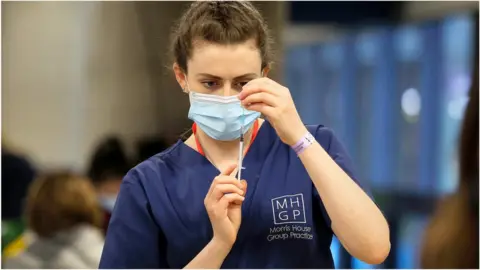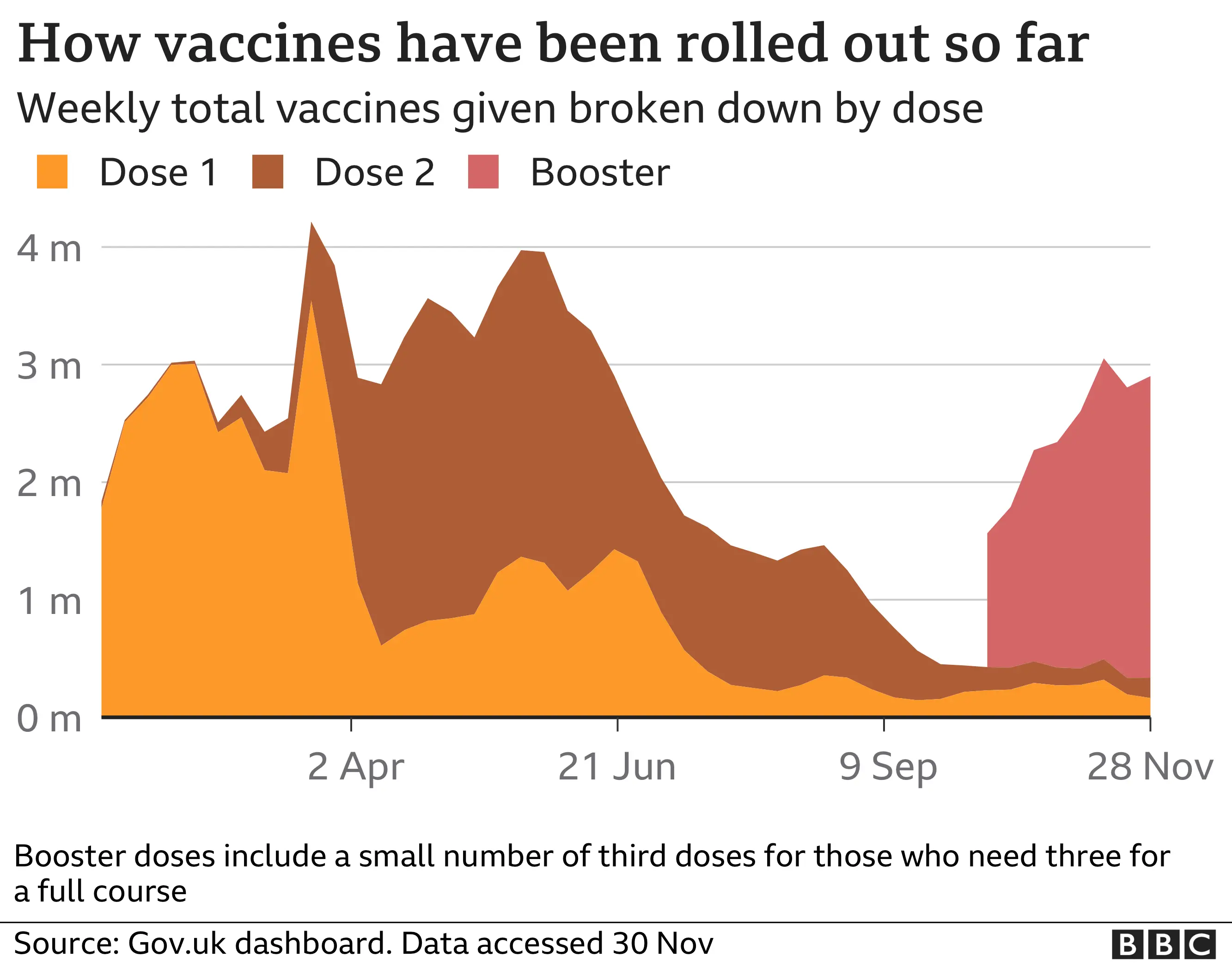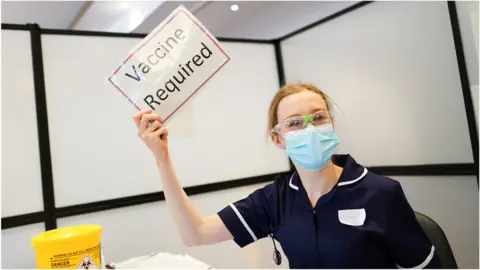Covid: Can the NHS boost the booster programme?

 Getty Images
Getty ImagesThe scientists are clear - accelerating the booster programme will be crucial to see off a deadly wave of Omicron, if the worst fears about the new variant are realised.
It is why ministers have agreed to offer boosters to the whole adult population and halve the gap between the second dose and booster to three months.
But, of course, it will make a difference only if those jabs are in arms.
Ministers have set a target of every eligible adult being able to book a jab by the end of January.
It applies to England only, although the devolved nations are putting in plans to ramp up their own programmes.
Can it be done? Crucially, there is plentiful supply.
The last of the 100-million order from Pfizer is due to be delivered in the coming weeks.
That alone, without factoring in supplies of the Moderna vaccine, would be enough to vaccinate everyone.
Instead, the challenge lies in increasing the amount of jabs the NHS can administer.


Currently, about 2.5 million booster doses a week are being given in the UK. Factor in first and second doses, and it brings the total to just over 2.8 million.
At that rate, it would take three months or so to vaccinate all adults.
Compare that with the peak of the vaccination programme, in March, when more than four million doses a week were being given, and you can see the NHS is some way short of the capacity it was running at.
Some of that will be down to demand - the NHS can vaccinate only those coming forward.
But it is also true some of the infrastructure in place in those early days has been taken out.
'We need to work together'
In England about 50 mass vaccination centres have closed - a third of the total.
Many GPs have also pulled out of Covid vaccinations to concentrate on their day-to-day patients and flu jabs. Although there are still around 1,000 Covid clinics run by them, but largely staffed by nurses.
Gloucestershire GP Dr Richard Probert is involved with one. He says upping the number of boosters will be "very, very hard" particularly with Christmas coming up and the complexity of continuing to offer both first and second doses along with an extra fourth jab for for people with weakened immune systems.
Pharmacies are increasingly stepping in - nearly 1,500 are now involved in England alone. But they are constrained by lack of staff.
The experience of Shabbir Damani, who runs Halls The Chemist in Peterborough, is typical. His centre has capacity to administer 1,500 vaccines a day but is achieving only half that.
Mr Damani needs first-aiders and administrative support to free up his team of vaccinators to jab more. "We can only do this by working together," he adds.
His words have echoes of the spring, when thousands of people up and down the country volunteered their time to put those initial jabs in arms.
 Getty Images
Getty ImagesFurloughed workers offered their time for free and council staff were redeployed to work alongside NHS vaccinators in what Health Secretary Sajid Javid called one of the "greatest collective endeavours in peacetime".
That sort of support will not be so easy to come by this time, which is why the support of the military - 400 personnel are being deployed to help the NHS - and others will be important.
Extra resources will also be needed for the vaccination buses. In many areas, councils converted library buses and other vehicles into mobile clinics.
These have been running pop-up clinics but, in recent months, often for only one or two days a week.
We will win through - NHS boss
Hospital hubs look set to play a crucial role too. More than 200 hospitals can offer the Covid vaccine.
They have largely focused on vaccinating NHS staff - only 30 are currently jabbing members of the public.
But again, if they are to open their doors, they will need support. Hospitals are already under huge strain.
It is clear there are some huge logistical issues to overcome - and questions remain over from exactly where the army of helpers needed will come.
But they are challenges Amanda Pritchard, the newly installed chief executive of the NHS in England, believes can be negotiated. With public support, the can-do spirit of the NHS "will win through", she says.
It will not take long to find out if she is right.
Follow Nick on Twitter.

- LOOK-UP TOOL: How many cases in your area?
- SYMPTOMS: What are they and how to guard against them?
- YOUR QUESTIONS: We answer your queries
- VACCINE: When will I get the jab?
- NEW VARIANTS: How worried should we be?


Are you planning on getting a booster vaccine? Have you been affected by issues raised in this article? Tell us about it by emailing: [email protected].
Please include a contact number if you are willing to speak to a BBC journalist. You can also get in touch in the following ways:
- WhatsApp: +44 7756 165803
- Tweet: @BBC_HaveYourSay
- Or fill out the form below
- Please read our terms & conditions and privacy policy
If you are reading this page and can't see the form you will need to visit the mobile version of the BBC website to submit your question or comment or you can email us at [email protected]. Please include your name, age and location with any submission.
